Plateaus & Waterfalls
The emotional roller coaster of fat loss.
When I come off a few days of straight weight loss, have to order new pants, and they fit: it’s the best feeling in the world. I’m prancing around in my new jeans like Bambi, feeling like the slimmest 235 pounder in town.
But I’m not going to lie to you: even after being down nearly 60lbs, I still sometimes think that my diet doesn’t work, and it’s a massive downer.
There are regular plateaus on ex150, despite it being by far the most reliable, rapid, and consistent (in terms of not having huge weight swings) diet I’ve ever tried. I’ve had a plateau for 14 days straight. I plateau for 10 days sometimes. And 7 days is actually pretty common.
After 4-5 days without seeing the scale move at all, I get anxious. Did the diet stop working? Did I accidentally break it? Is my mojo gone? Why is it not moving? What did I change?
Then, typically, the weight goes down, often in a whoosh of 2-3 lbs in as many days.
Of course it’s not guaranteed that the weight comes down. Most people eventually plateau completely on any given diet. Maybe this is that time? Maybe this is it? Maybe I have to change it up or start crazy fasting schemes to make any further progress?
It’s a fine line between “trust the process” and “change what doesn’t work” when you’re not entirely sure if something will continue to work, because you don’t know why it works.
You’ll probably make it through a 7 day plateau still “trusting the process.” But what about 2 months?
The Malaise
After starting ex150 in late September of 2022, I lost weight at a rate of over 10lbs/mo for pretty much 4 months straight, with a few small exceptions when I went off the diet. My initial blog post proudly proclaimed a 43lbs loss, and I expected to be at my goal weight of 188lbs in another handful of months.
Then, The Malaise began. I lost weight at a steady pace for about another week, experimenting with success, until I hit 244lbs in late February.
I wouldn’t significantly break the 244lbs until late April, two months later. I broke it once or twice, but the weight would bounce back up. Re-feeds would put on insane amounts of weight, and they’d take a long time to come back off. I’d plateau, or even go slightly up by 1-2lbs for weeks at a time. Even after I broke through briefly, I’d gain 4lbs back between experiments, and they would stick for nearly 2 weeks again.
It’s easy in retrospect to tell myself “Oh well, you lost over 40lbs at a rapid pace, and then for March and April you only lost about 3lbs per month. That’s not bad. At least you didn’t gain it all back!”
But at the time, in the middle of it, it sure felt terrible.
Pro-tip: don’t get addicted to the scale going down :D
What caused The Malaise?
Of course I’m not 100% sure, science is hard. But my #1 suspect is sleep deprivation.
The vertical red line in the above graph is the beginning of Daylight Savings Time, my old nemesis. This abominable concept steals 1 hour of sleep from you every day, until a few months later, when the sun has caught up with the clock.
Notice how, right before DST, I was still losing like crazy? The brief peak is a pause between diets, and then I’m on ex150choctruffle for 14 days. And, eating ad libitum CHOCOLATE TRUFFLE, I still went from 250lbs to 243lbs in 11 days.
And then: DST. Immediately back up 2lbs. Down 2. In the following diet break, all the way back up to 250. Trickle down, trickle up.
Something in the graph just seems materially different, and it starts around the time DST happened.
What does Daylight Savings Time have to do with fat loss?
Probably quite a bit. Sleep is pretty important, and sleep deprivation has huge effects on everything from glucose tolerance, satiety, to general well-being.
DST has always messed me up for weeks. Maybe even months, and I just never really noticed it the whole time?
One symptom that I noticed this time: my beloved cement-truck satiety, and the boundless energy from eating cream, were suddenly gone. Cement-truck satiety is what I call it when you eat whipped cream, and it turns from delicious to “couldn’t possibly eat another spoon” within a few seconds.
I’d eat my allotment of cream for that night, and I’d feel nothing. No satiety.
Now it’s not that I then overate. I think that’s what happened in the past - eating carbs and protein ad libitum, when my satiety signal wouldn’t come in, I’d just keep eating.
I don’t even want to imagine what The Malaise would’ve looked like before ex150. At least, with the cream, I wasn’t ravenous. I just wasn’t oversatiated, like had been most days on ex150.
So why is DST so pernicious? It’s not just 1h of jet lag.
One hour of jet lag isn’t that bad, because you adapt to it in about a day. It takes roughly 1 day to shift your circadian rhythm by an hour. A little easier for most people to go west than east, but then let’s extend it to 2 days if you go east.
The cause of jet lag is a mismatch between your internal, circadian clock and the wall clock time. If you fly from New York City to Chicago, the clocks are mismatched by 1h. You adapt for 1 day, and then they match and you’re good.
You can’t adapt to DST because you’re still in the same location, and the sun doesn’t come up any earlier. The next day, when you wake up, the clocks are mismatched by 1h again!
Since your wakeup time is mostly dictated by sunrise, and the sun now permanently rises 1h later, you’re effectively flying west by 1h per day.
DST is equivalent to getting 1h of jet lag EVERY DAY for 2 months.
Imagine that, jetting an hour east every day. You’d have traveled from the West Coast to the East Coast by the time the weekend rolled around. Soon, Europe.
You’d never fully get used to any given timezone.
Eventually, the sun catches up, of course. But this can take quite a while. It depends on your latitude, but it takes about 1.5-2 months until the sun rises at the same time as the day before DST.
Does this affect everyone equally?
Probably not. I’m somewhat of a night owl (even with my Non-24 in remission), naturally waking well after sunrise, typically between 8:30-10am.
So when you cut an hour off every morning so I can get to work on time, that really hits me. Comes right out of my sleep.
But if you’re someone who wakes up at 6am anyway, and you have plenty of time before work (or school, or whatever other obligations you might have), it might not make as much of a difference for you. It’ll just cut short your chill morning pre-work time when you normally do your gardening or your workout or newspaper reading. Or whatever it is you morning people do.
It could also be that different people’s metabolism is affected by sleep deprivation in similar ways. Plenty of people tell me that DST “doesn’t even bother them.” Now I think a lot of them are full of it and just don’t notice/won’t admit it, but I’m sure there is some actual variation in the effect.
So, is The Malaise over?
I sure hope so. Let’s overlay the start of DST, and the day that the sun finally rises at the same time again, on top of the Malaise graph we’ve seen above:
Well, if that isn’t a pretty decent fit, I don’t know what is. Right after the DST switch, my weight goes up rapidly and never quite comes back down for about a month. This would be the period where I’m losing a whole hour of sleep every night.
Of course the sun doesn’t just sit there for 2 months and then jump back, it slowly creeps earlier and earlier by a minute or so every other day.
After a month, I start losing a bit again. But it’s still kind of a slower situation. Then, toward the end of April, things start moving more rapidly. There’s still a long plateau here and there, but then typically there’s quite a whoosh directly after.
If you looked just at the second half of that period, it wouldn’t actually look quite that bad. There was a pretty successful 2 week run with ex150-5, and I lost a decent amount of weight (if less than expected) on ex150sardines.
And it’s been whooshing quite a bit. I had to order new pants again, marking 10 inches off my waist if Wranglers are to be believed.
I hit 237lbs a few days ago, which marks my lowest weight since 2017:
Conclusion
Even on the best diet, well executed and prepared, with lots of experience, there will be confounding factors.
You will lose sleep. Your job will stress you. People in your life will do confusing things. Travel. Seasons. Magnets. Pandemics.
What’s pretty lame is that I can basically throw out all the experiments I did during The Malaise. If you remember, I marked quite a few of them as confounded:
ex150choctruffle (worked great until DST hit)
ex225lean (REALLY expected this one to work)
ex150monkfruit (same)
Oh well, if science was easy, everyone would be doing it, right? Guess I’ll have to run some of those experiments again.


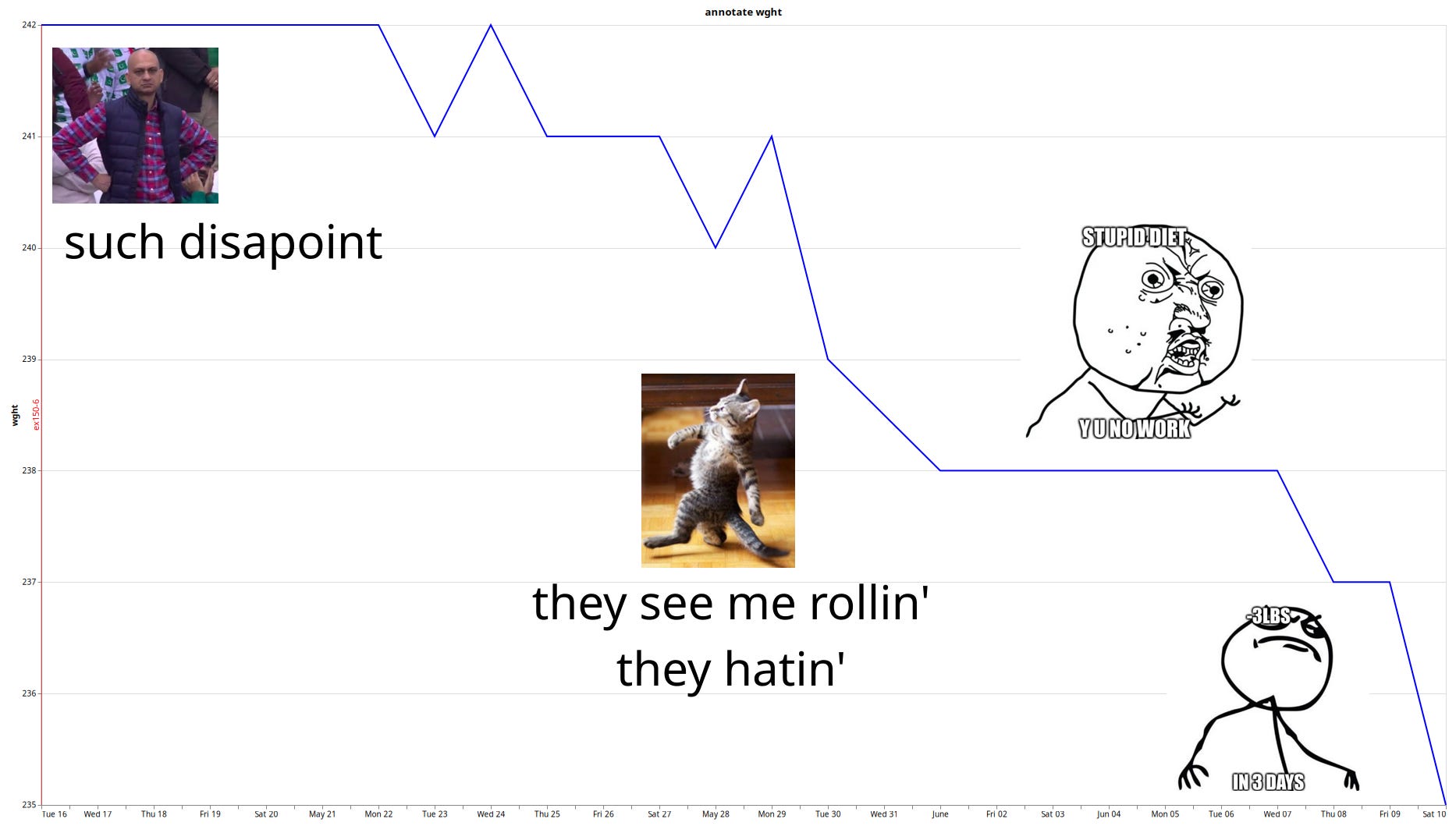

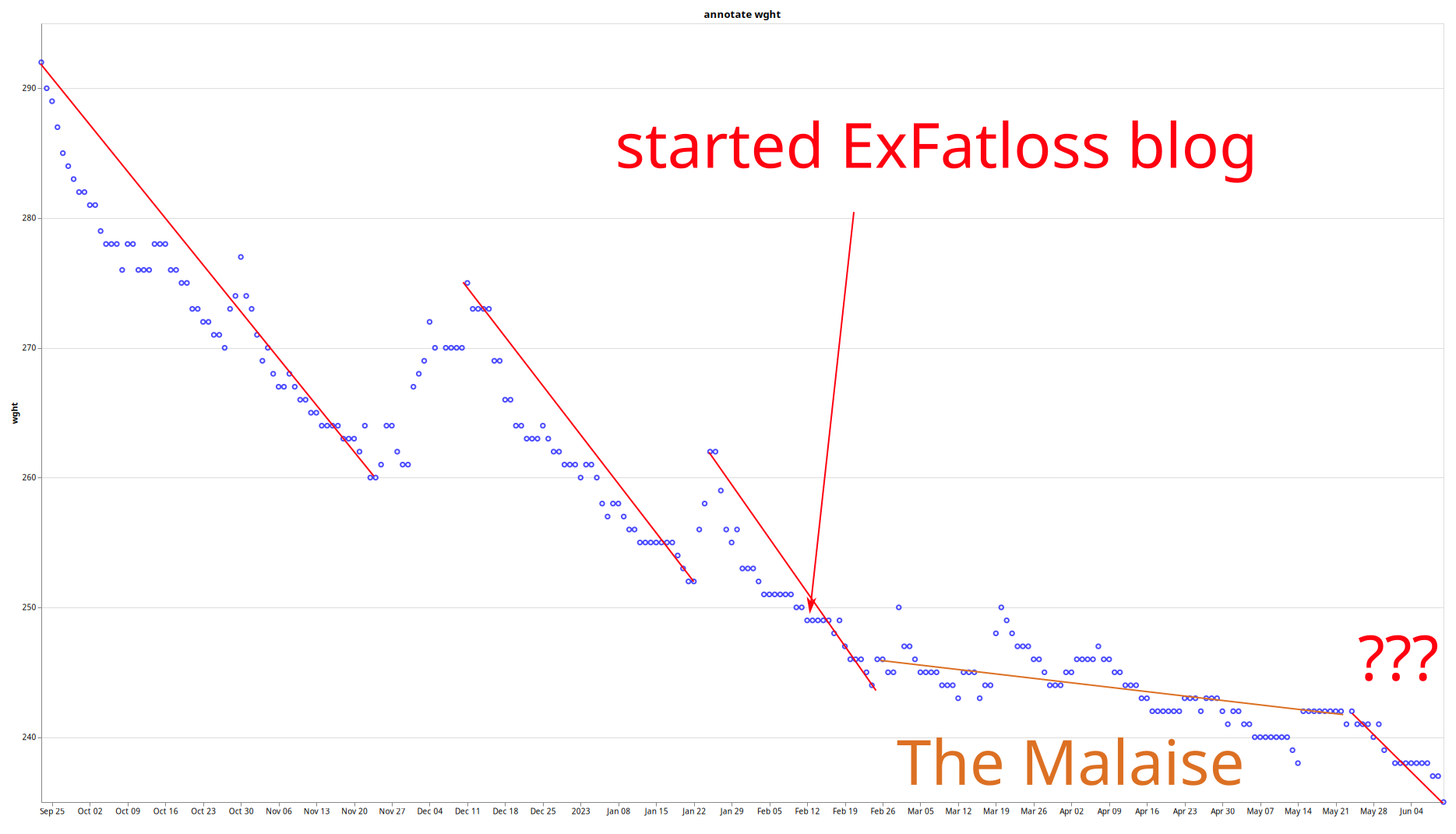
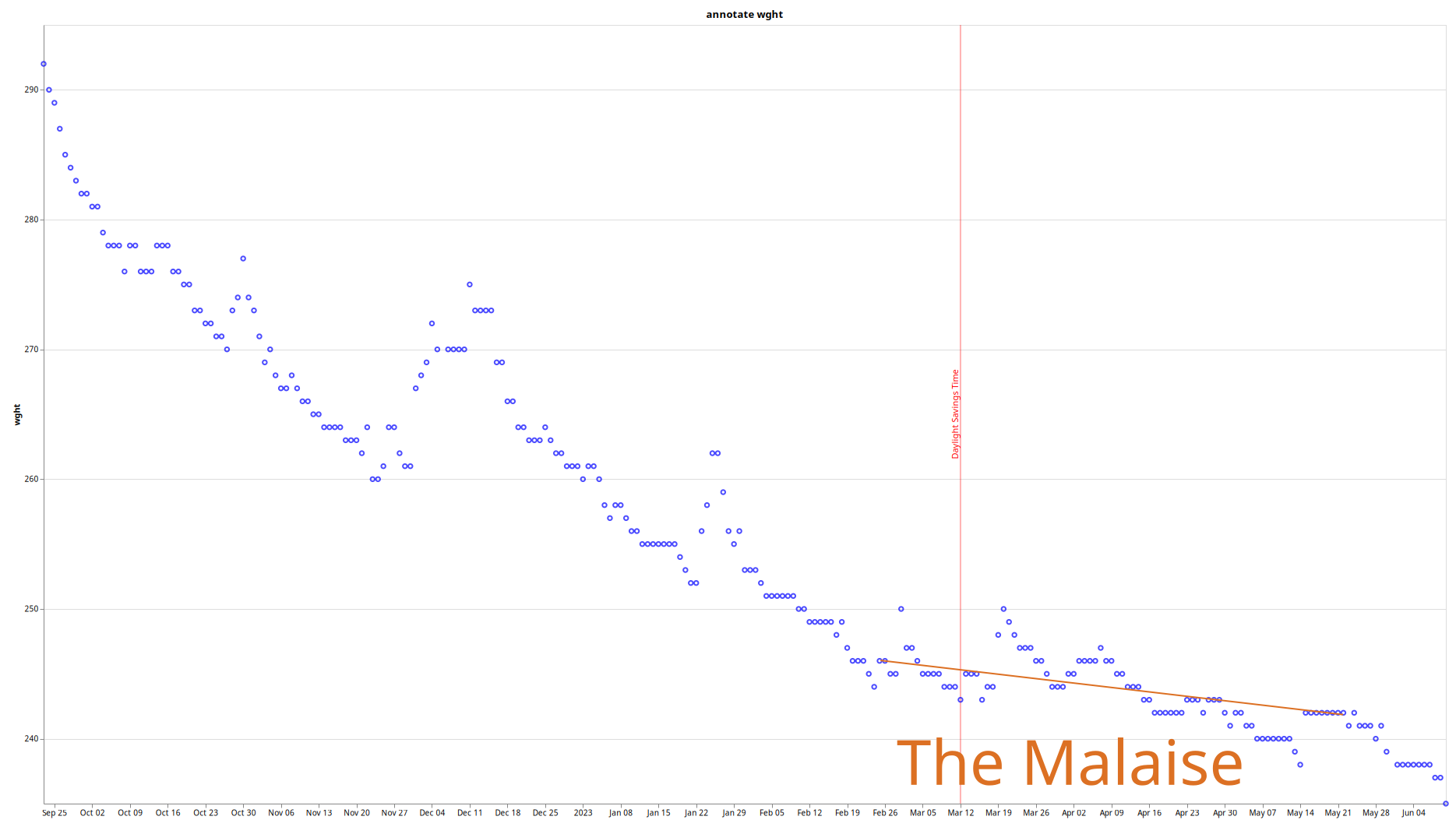

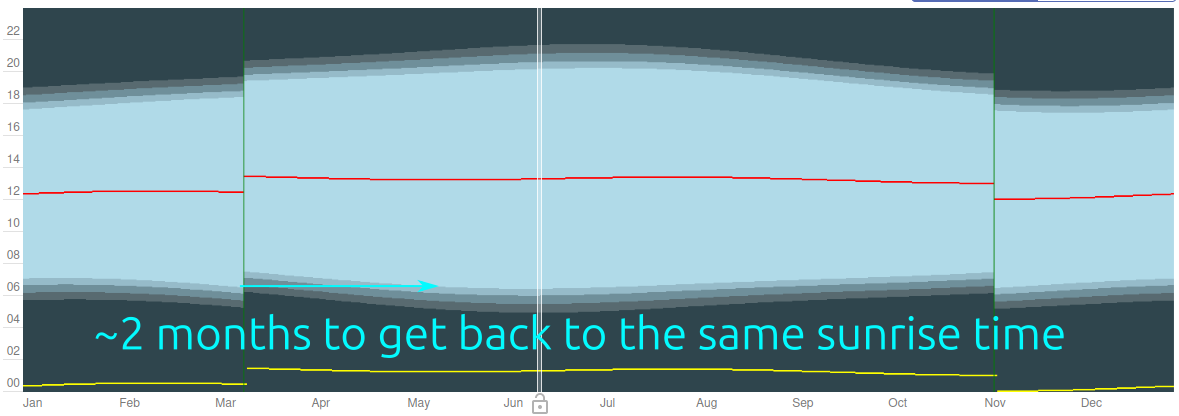
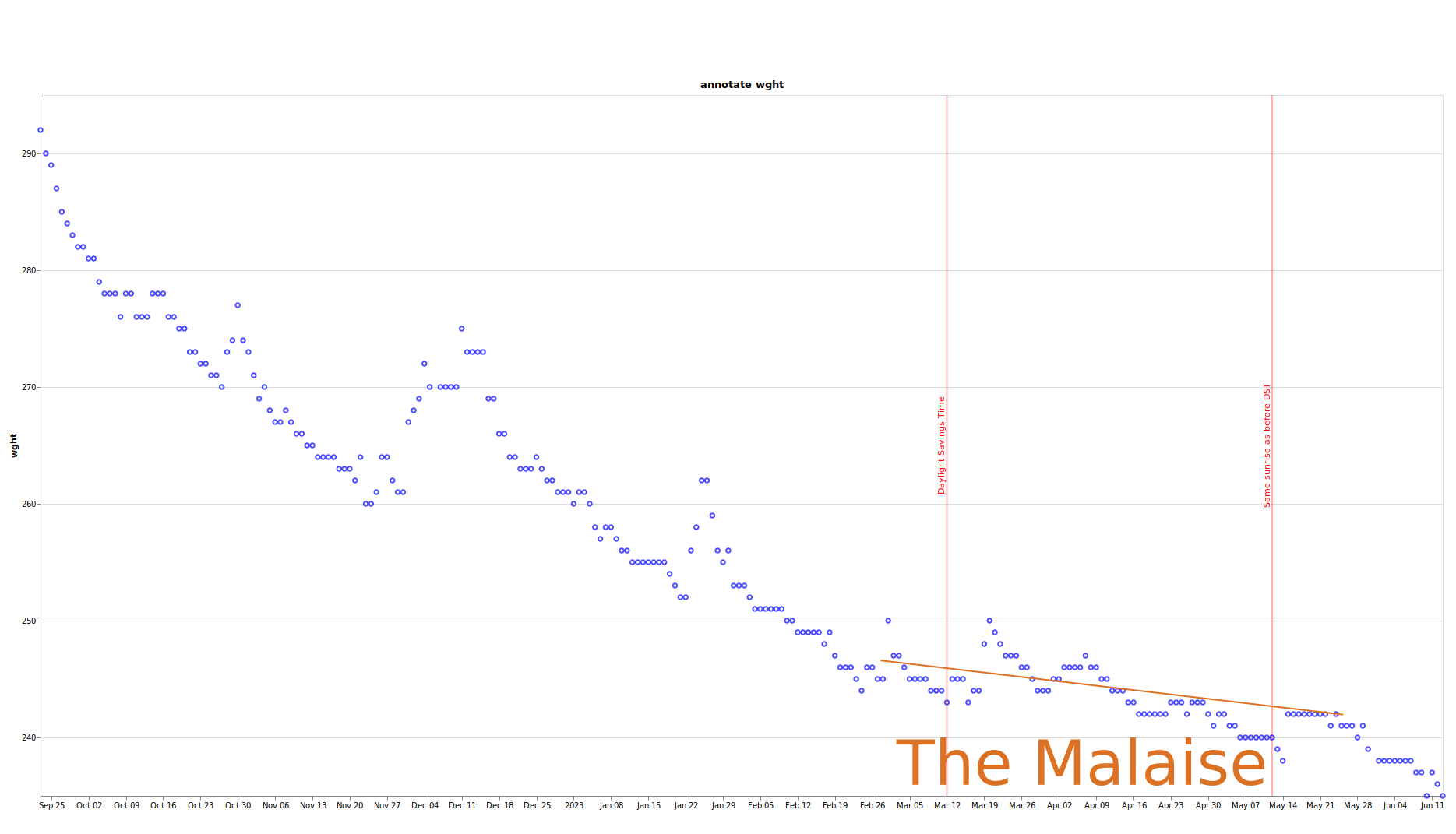

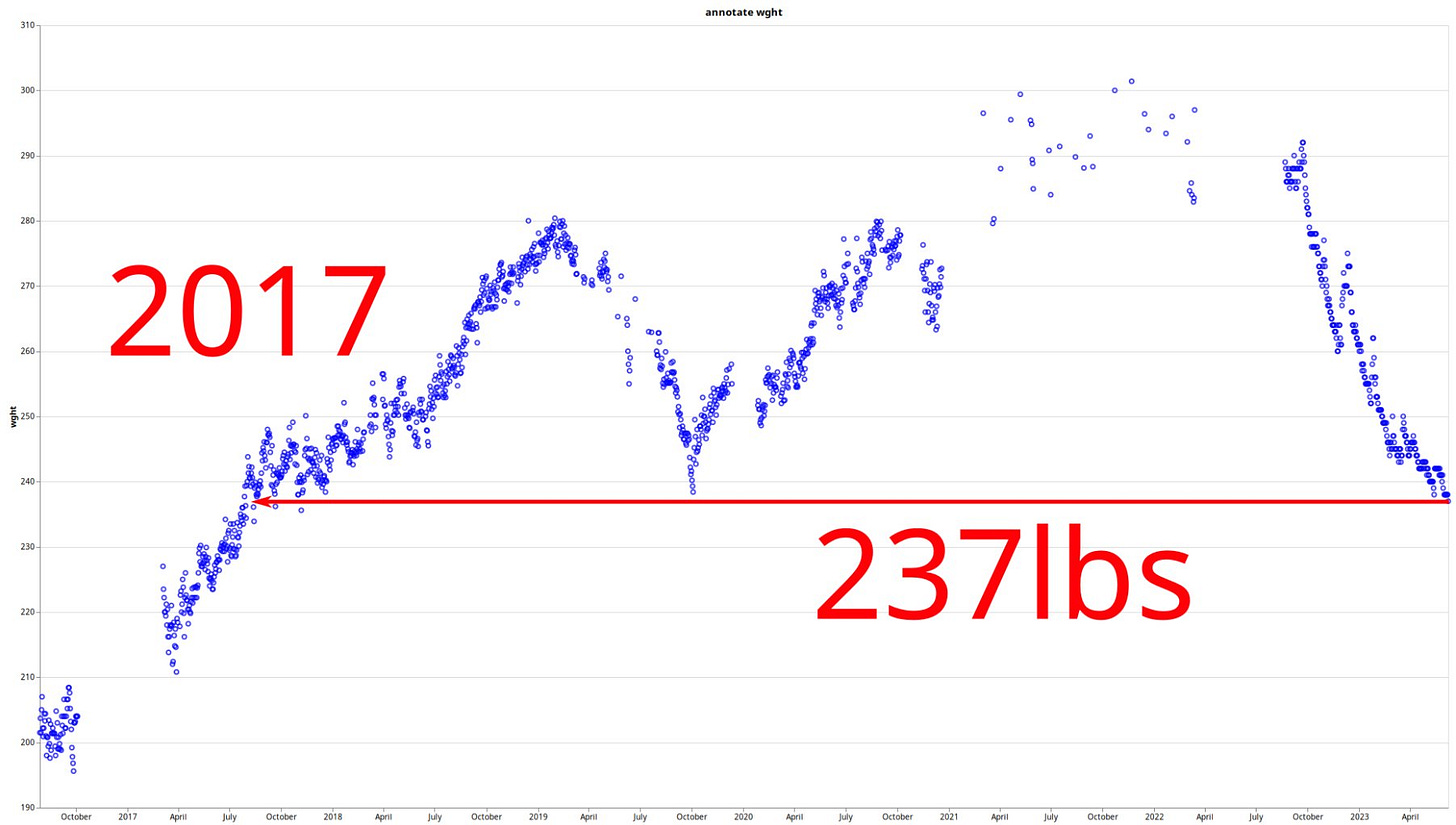
DST wreaked an initial 6 hours havoc this year and it had a cascading effect . It's one of the increasingly deleterious twice a year events.
That correlated with an increasingly diminished sleep quality that evolved into an excruciating sleep disorder. That feeds back into an eating compensatory mechanism?!
Your weight sudden increase and values are eerily similar to mine.
I had a drop at 238 last year in January when I volunteered to work in the overflowing infectious diseases ward as a Preventative Contamination Agent ( have a clinical background in surgical and public health- but not working in the last 8 years because my spouse got a better stable job, and we made a pow-wow and decided that's more important to have a parent around and available at all times . So the one with the most stressful job ( was me at the time - couldn't just cut the cord and went into a late midlife complex grad research med degree - at least now I am more astute in identifying the plethora of manipulative and "data massage" in papers.
For reference, I am 266 now, dropped 11 pounds after a concussion, that proved to be beneficial indirectly , by getting a vast degree of solace using anti- orexin class of drugs for the sleep disorder . I take them for more than a week and it's , for now, the only thing that mitigates to a significant extent the non-24 working Dx.
In conjunction with a biofeedback sensor ( that improved in a week my breathing meditation winding down for sleep.
Fron healthmath.con.
It's in loan from the psychiatrist. It's not available directly in Canada, but it's a modality that, in the past, due to my skewed skepticism towards non alopatic medicine approaches, I dismissed as " gimmicky ".
Until I read the newer ( meaning last 9 years ) research results .
As an anecdotal empirical note. I dropped 11 pounds ( I convert because the substack is US imperial measurements oriented) last month by not necessarily dieting per se.
It's a combination of increasing thermogenesis ( progressive colder showers ) and affordability of fresh tasty vegetables/ fruits in Montréal's markets.
And deliberately reducing the baguette consumption ( the nearby bakery won a baguette contest in France - Sacre Dieux !! lol) .
Swapped my plain wool blanket with a real " french linen" linen sheet . ( painfully expensive from Baloo Canada ( it's a US based) .
As a note, I let the water evaporate and carry some heat away.
Another fun fact. Cold city water now doesn't feel so cold ( maybe because it's not, it's summer, but I don't have gasp as much when hit with cold water and I don't need to progressively go for it.
Another weird one. I don't need to take my anti-inflammatoires pain medication in fill dose . I oscilate now between 1/4 and 1/2 . Some days I think it's just by fear of not having it returning.
Do you have to awaken according to the wall clock? Could you set your schedule such that you sleep and eat according to the sun? That way, when DST starts / ends, you could simply let your body just keep going even though the clock must be adjusted.